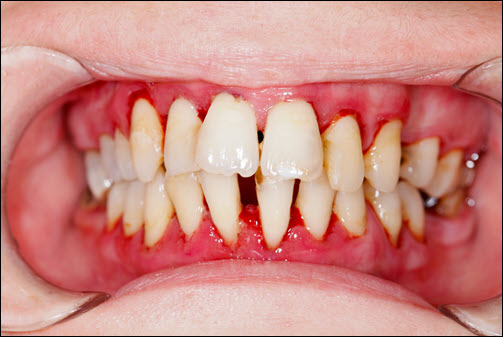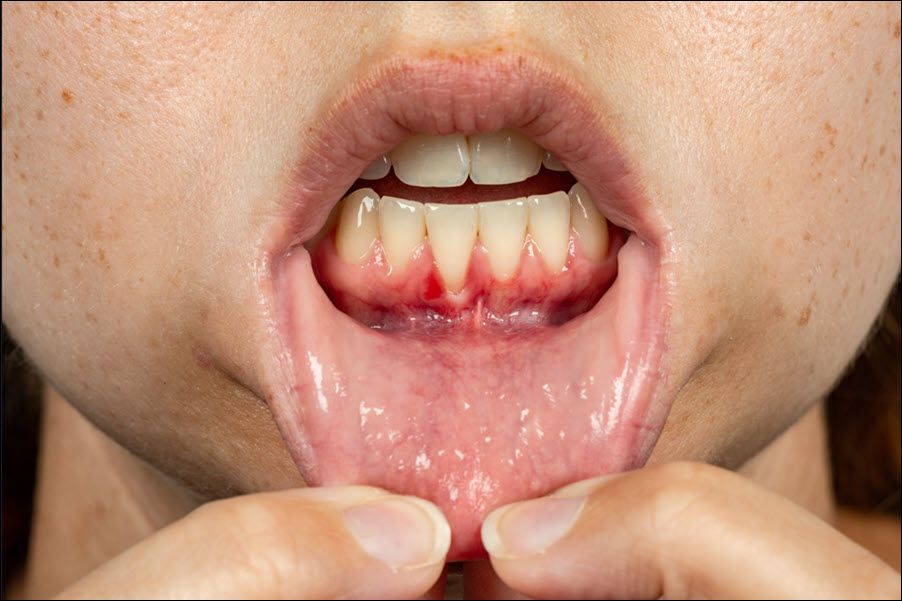Gum disease weakens gum tissue and threatens tooth stability. Plaque buildup along the gumline causes inflammation and infection. If untreated, gum disease leads to gum recession, tooth loss, and bone damage. Proper oral care and professional cleanings prevent gum disease and improve gum strength. Healthy gums support tooth stability and improve bite strength. Brushing, flossing, and using mouthwash reduce plaque and bacteria. Early detection and treatment reverse gum disease and prevent complications. Understanding how to prevent gum disease strengthens overall dental health. Let’s explore how to protect your gums and maintain a healthy smile.
Brushing to Remove Plaque and Strengthen Gums
 Brushing twice a day removes plaque and protects gums. Use a soft-bristled toothbrush and fluoride toothpaste. Hold the toothbrush at a 45-degree angle to the gumline. Use small, circular motions to clean all tooth surfaces. Brush for at least two minutes to remove plaque effectively. Clean the front, back, and chewing surfaces of each tooth. Brush your tongue to remove bacteria and improve breath freshness. Replace your toothbrush every three months or when bristles fray. Electric toothbrushes improve plaque removal and increase brushing consistency. Proper brushing strengthens gum tissue and reduces inflammation. Clean teeth and gums improve overall mouth health and comfort.
Brushing twice a day removes plaque and protects gums. Use a soft-bristled toothbrush and fluoride toothpaste. Hold the toothbrush at a 45-degree angle to the gumline. Use small, circular motions to clean all tooth surfaces. Brush for at least two minutes to remove plaque effectively. Clean the front, back, and chewing surfaces of each tooth. Brush your tongue to remove bacteria and improve breath freshness. Replace your toothbrush every three months or when bristles fray. Electric toothbrushes improve plaque removal and increase brushing consistency. Proper brushing strengthens gum tissue and reduces inflammation. Clean teeth and gums improve overall mouth health and comfort.
Flossing to Clean Between Teeth and Under the Gumline
Flossing removes plaque and food particles from between teeth and under the gumline. Use about 18 inches of floss, wrapping it around your middle fingers. Gently slide the floss between teeth using a back-and-forth motion. Curve the floss into a “C” shape around each tooth. Clean under the gumline without snapping the floss. Flossing reduces gum inflammation and improves gum attachment. Water flossers provide an alternative for hard-to-reach areas. Flossing once a day prevents plaque buildup and gum disease. Clean gumlines increase tooth stability and reduce sensitivity. Stronger gums improve bite strength and overall dental comfort. Flossing protects against cavities and gum infections.
Using Antibacterial Mouthwash to Reduce Plaque
Mouthwash reduces plaque and strengthens gum tissue. Antibacterial mouthwash kills bacteria that cause gum disease and bad breath. Pour about 20 milliliters of mouthwash into a cup. Swish it around your mouth for 30 to 60 seconds. Gargle to clean the back of the throat and remove bacteria. Spit out the mouthwash and avoid rinsing with water afterward. Alcohol-free mouthwash prevents dry mouth and gum irritation. Fluoride-based mouthwash strengthens enamel and improves gum resistance to plaque. Regular use reduces gum inflammation and increases plaque control. Clean gums increase tooth stability and improve breath freshness. Stronger gums increase comfort and overall mouth health.
Eating a Balanced Diet to Strengthen Gums
A balanced diet improves gum health and tooth strength. Calcium-rich foods like milk, cheese, and yogurt strengthen enamel. Vitamin C from oranges, strawberries, and bell peppers reduces gum inflammation. Leafy greens provide essential nutrients that improve gum strength. Crunchy fruits and vegetables clean teeth naturally and stimulate saliva flow. Nuts and seeds supply magnesium and phosphorus, strengthening tooth roots. Avoid sugary snacks and acidic drinks that increase plaque formation. Drinking water after meals washes away food particles and plaque. Better nutrition increases gum strength and reduces sensitivity. Stronger gums improve bite strength and overall chewing comfort.
Avoiding Smoking and Tobacco Products
Smoking weakens gum tissue and increases plaque buildup. Nicotine reduces blood flow to gums, slowing healing and increasing sensitivity. Tobacco use increases the risk of gum disease and tooth loss. Smoking reduces saliva production, increasing dry mouth and plaque formation. Quitting smoking improves gum health and reduces gum inflammation. Better blood flow strengthens gum attachment and improves tissue repair. Smokeless tobacco increases gum recession and enamel wear. Avoiding tobacco reduces plaque buildup and increases gum strength. Stronger gums improve tooth stability and bite comfort. Quitting tobacco increases overall dental health and comfort.
Managing Stress to Protect Gum Health
 Stress increases inflammation and weakens immune response, increasing gum disease risk. High-stress levels increase teeth grinding and jaw tension. Grinding weakens tooth enamel and increases gum recession. Relaxation techniques reduce stress and improve gum health. Deep breathing, yoga, and meditation reduce cortisol levels and improve immune strength. Proper sleep improves gum tissue repair and reduces inflammation. Stress increases plaque formation and weakens gum attachment. Managing stress increases overall comfort and strengthens gum health. Better gum health reduces sensitivity and improves bite strength. Reducing stress increases comfort and overall dental health.
Stress increases inflammation and weakens immune response, increasing gum disease risk. High-stress levels increase teeth grinding and jaw tension. Grinding weakens tooth enamel and increases gum recession. Relaxation techniques reduce stress and improve gum health. Deep breathing, yoga, and meditation reduce cortisol levels and improve immune strength. Proper sleep improves gum tissue repair and reduces inflammation. Stress increases plaque formation and weakens gum attachment. Managing stress increases overall comfort and strengthens gum health. Better gum health reduces sensitivity and improves bite strength. Reducing stress increases comfort and overall dental health.
Visiting the Dentist for Regular Cleanings
Professional dental cleanings remove plaque and tartar buildup. Tartar hardens on tooth surfaces and increases gum inflammation. Dentists use ultrasonic tools to remove deep plaque and tartar. Scaling and root planing smooth tooth roots and improve gum attachment. Professional fluoride treatments strengthen enamel and reduce sensitivity. Dentists recommend cleanings every six months to maintain gum health. Professional monitoring detects early signs of gum disease and decay. Early treatment reduces inflammation and improves gum tissue strength. Stronger gums increase tooth stability and chewing comfort. Regular cleanings improve overall dental health and comfort.
Protecting Gums with Proper Oral Care
Daily oral care protects gums and prevents plaque buildup. Brushing, flossing, and using mouthwash reduce bacteria and inflammation. Professional cleanings improve gum health and tooth strength. Antibacterial mouthwash reduces plaque and gum irritation. Fluoride toothpaste strengthens enamel and reduces plaque formation. Avoiding hard and sticky foods protects enamel and gums. Wearing a mouthguard reduces gum pressure from grinding and jaw tension. Treating misaligned teeth reduces gum strain and plaque buildup. Better gum health increases overall dental comfort and bite strength. Consistent care strengthens gums and improves long-term dental health.
Boosting Confidence with Stronger Gums
Healthy gums improve smile strength and appearance. Balanced gumlines create a symmetrical smile and improve facial balance. Reduced plaque buildup increases comfort while eating and speaking. Stronger gums improve tooth stability and chewing efficiency. Proper gum attachment reduces sensitivity and improves bite strength. Better gum health reduces bad breath and increases smile confidence. Healthier gums improve both social and professional comfort. Improved tooth and gum strength increases overall dental comfort. Balanced gum health improves smile strength and personal confidence. Stronger gums increase long-term dental health and comfort.
Preventing gum disease strengthens teeth and improves smile appearance. Brushing and flossing daily reduce plaque and improve gum strength. Antibacterial mouthwash reduces inflammation and improves gum health. Eating a balanced diet increases gum strength and reduces sensitivity. Quitting smoking increases blood flow and improves gum attachment. Managing stress reduces gum inflammation and strengthens tissue repair. Regular dental cleanings prevent tartar buildup and improve gum health. Consistent oral care increases gum strength and tooth stability. Investing in better gum health increases comfort and confidence. Healthy gums create a balanced, stronger smile.



